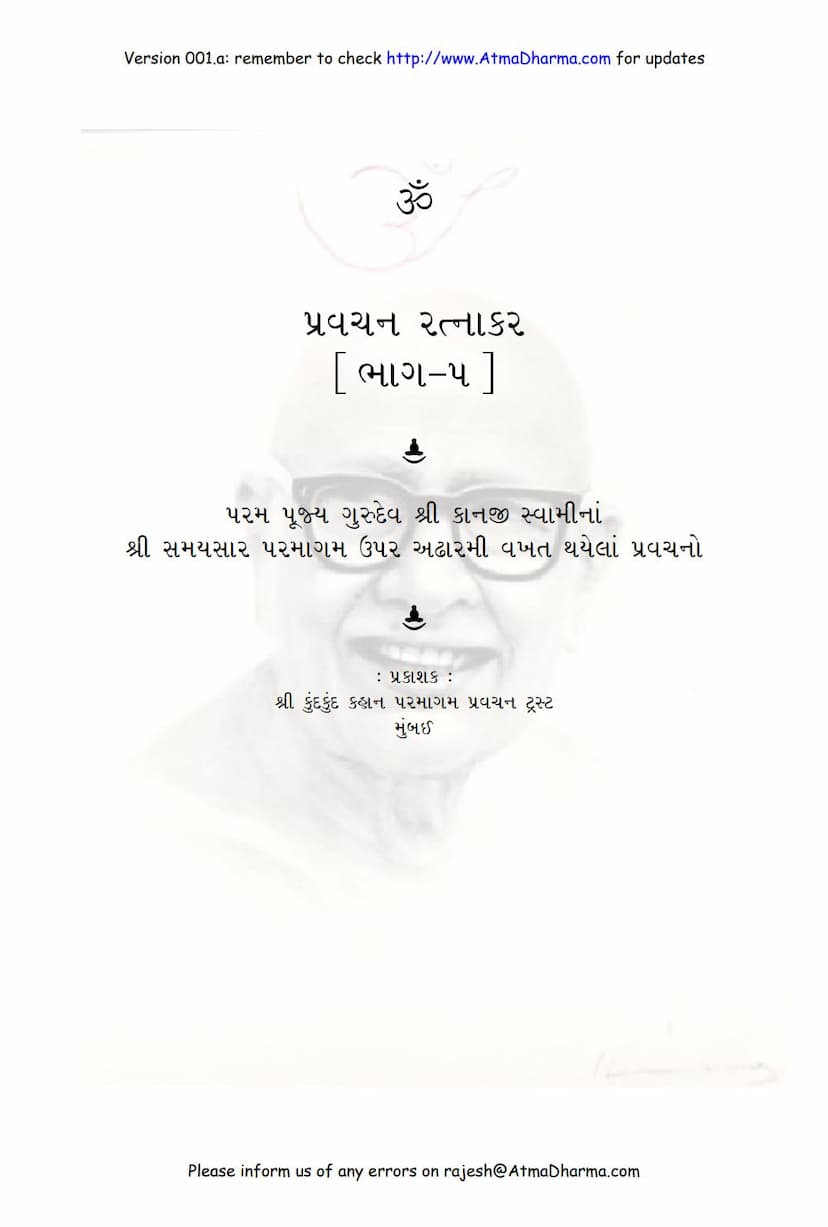Pravachana Ratnakar 05
Added to library: September 2, 2025

Summary
This document is the fifth part of the "Pravachana Ratnakar" series, based on the discourses of Param Pujya Gurudev Shri Kanji Swami on the holy scripture "Samaysar Paramaagam." It was published by Shri Kundkund Kahan Paramaagam Pravachan Trust, Mumbai. The catalog link provided is jainqq.org/explore/008286/1.
The content focuses on the discourse on "Samaysar", specifically detailing the discussions on Karma and the nature of the Soul (Jiva). The text elaborates on the concept of Karta-Karma Adhikar (the chapter on doer and action), explaining the Jain philosophical principles of causality, independent existence of substances, and the distinction between the Soul (Jiva) and its modifications or karmas (Pudgala Karma).
Here's a breakdown of the key themes and arguments presented:
Core Principles Discussed:
- Svatantra Parinama (Independent Causation): A fundamental Jain principle is highlighted – each substance (dravya) has its own independent nature and causality. The Soul (Jiva) has its own principles, and matter (Pudgala) has its own. They do not create or influence each other's intrinsic nature or actions.
- Distinction between Soul (Jiva) and Matter (Pudgala): The text strongly emphasizes that the Soul, being pure consciousness (Jiva), is fundamentally different from matter (Pudgala). Matter undergoes modifications and has qualities like touch, taste, smell, and color, while the Soul is characterized by consciousness, knowledge, and bliss.
- The Soul as the Karta (Doer) of its Own States: The discourses clarify that the Soul is the doer of its own states of consciousness (parinama). It is not the doer of matter's actions. For instance, the Soul experiences knowledge, but the physical act of seeing or hearing is an action of the physical senses (indriyas) and mind, which are matter.
- Rejection of External Causation: The text refutes the idea that external factors (like God, other beings, or even karmic matter in an absolute sense) are the doers of the Soul's actions or states. The Soul's modifications, whether considered pure (like knowledge) or impure (like passions), originate from its own inherent nature and past predispositions (karmic impressions), not from external forces.
- The Nature of Karma: Karma is described as a modification of matter (Pudgala) that attaches to the Soul due to the Soul's own deluded passions (kashayas). The Soul does not create karma; rather, its own deluded states (karma-uddya) act as a catalyst or impetus for the influx of karmic matter, which then undergoes its own transformations.
- The Role of Ignorance (Ajnana): Ignorance is identified as the root cause of the Soul's bondage and suffering. It is this ignorance that leads to the mistaken identification with the body, mind, and passions, causing the Soul to believe it is the doer and experiencer of these worldly states.
- The Soul's True Nature: The Soul is repeatedly described as pure consciousness (Jiva), omniscient (Kevali), blissful, and eternal. Its true nature is unchanging and independent of any external or internal modifications.
- Naya (Viewpoints): The text delves into the different Jain perspectives (Nayavad) – particularly Nischaya Naya (the ultimate truth perspective) and Vyavahara Naya (the conventional or practical truth perspective). It clarifies how Nischaya Naya reveals the Soul's pure, independent nature, while Vyavahara Naya describes the Soul's apparent states in relation to karma and the body. The discourses emphasize understanding these Nayas correctly to avoid misconceptions.
- The Path to Liberation: The ultimate goal is to transcend all attachment, including attachment to any particular naya or viewpoint, and to realize the pure, self-dependent, blissful nature of the Soul. This realization leads to liberation from the cycle of birth and death.
Key Concepts Elaborated:
- Karta-Karma Adhikar: This central theme explains who the true doer (karta) and the action (karma) are from the Soul's perspective. The Soul is the doer of its own conscious states (like knowledge, bliss), while matter is the doer of physical changes and karmic transformations.
- Nischaya Naya vs. Vyavahara Naya: The discourses meticulously differentiate between the ultimate reality (Nischaya Naya) where the Soul is seen as pure consciousness, untouched by karma, and the conventional truth (Vyavahara Naya) which describes the Soul's transmigration and interaction with karma due to ignorance. The importance of understanding Nischaya Naya for liberation is stressed.
- The Nature of Ignorance: Ignorance is portrayed as the fundamental misunderstanding of the Soul's true nature, leading to the erroneous belief in doership and ownership of karmic states and external objects.
- The Role of Attachment and Passion: Passions like anger, pride, deceit, and greed (kashayas) are identified as the primary drivers of karmic bondage. The discourses emphasize the need to extirpate these passions through self-awareness and practice.
- The Importance of Self-Realization: The path to liberation lies in recognizing the Soul's inherent purity and bliss, transcending all external and internal modifications, and abiding in one's own true nature.
The text, through its detailed explanations and analogies, aims to guide the listener (reader) towards a clear understanding of Jain philosophy, particularly the teachings of Acharya Kundakunda as interpreted by Shri Kanji Swami, focusing on the ultimate reality of the Soul's self-sufficiency and independence.